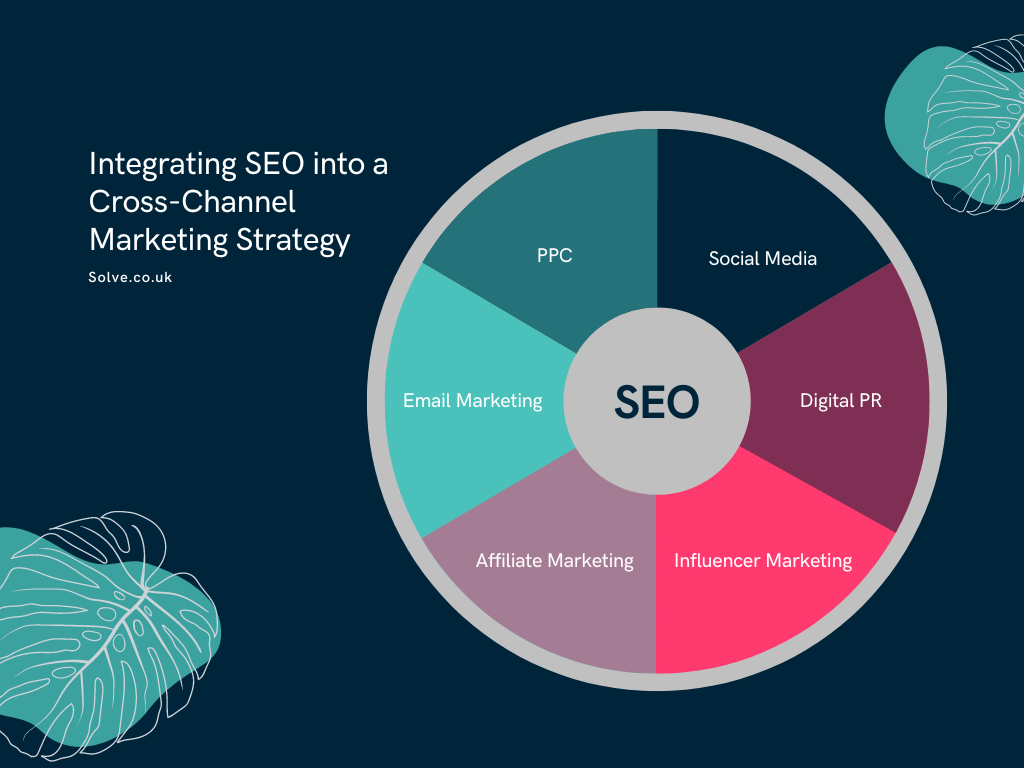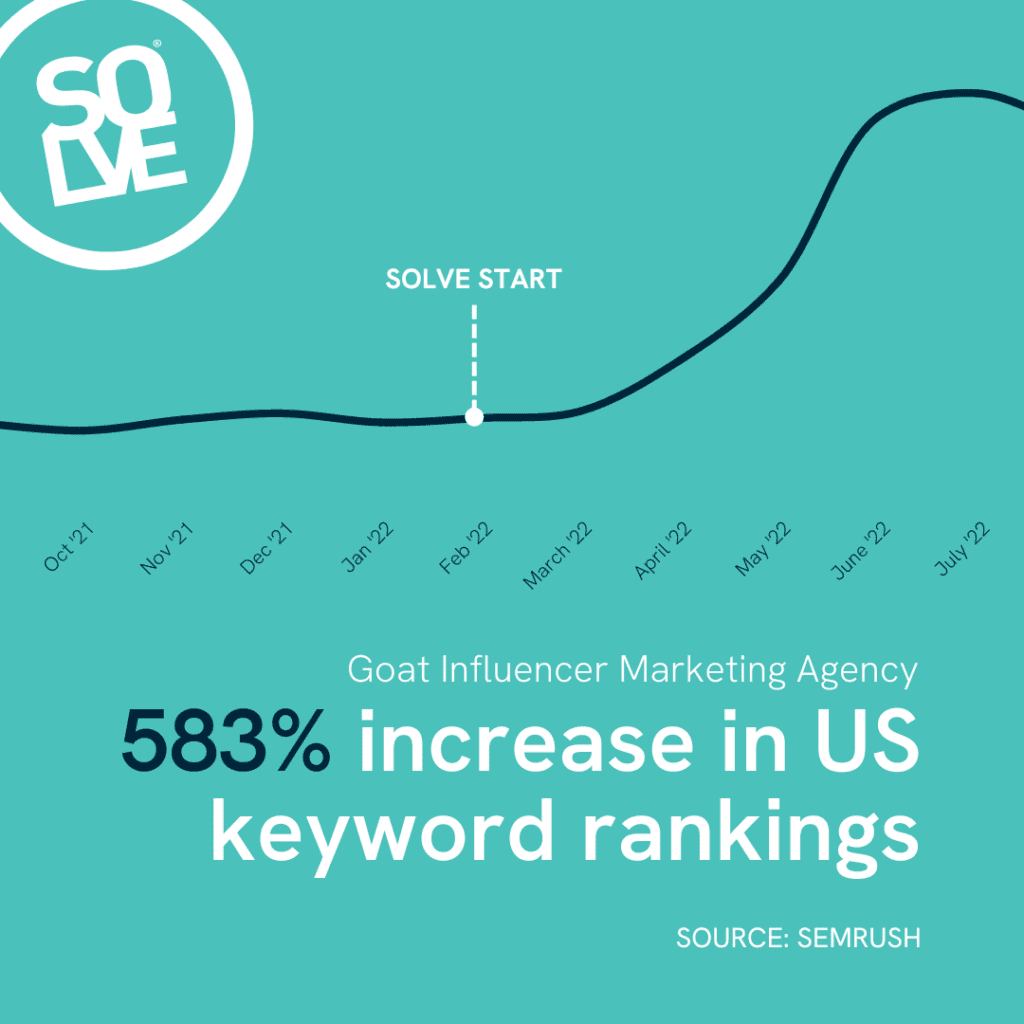
In today’s increasingly competitive world, businesses need a strong cross-channel marketing strategy, however, that can be easier said than done. Trying to balance and coordinate multiple marketing channels such as TikTok and Facebook, as well as aligning them all to a common target can be extremely difficult. But fear not! That’s where SEO can help. SEO is informed by research and ideas which can help you narrow down and determine what that common target or aim should be, and in turn, can be applied to all other marketing channels to link them all together. This blog discusses exactly how SEO can be integrated with other marketing channels within a cross-channel strategy to propel your business to the next level.
Table of Contents
68% of online Experiences Begin with a search engine.
What is SEO?
SEO stands for Search Engine Optimisation. It is essentially the practice of using online research to optimise a website allowing improvements in visibility and rankings within search engine results and therefore driving more organic traffic.
What is cross-channel marketing?
Cross-channel marketing involves integrating marketing channels to deliver a seamless and cohesive experience for customers. Both the messaging and experience should be consistent throughout and integrated as customers transfer between marketing channels and devices.
The benefits of a cross-channel marketing strategy
First things first, a cross-channel marketing channel strategy is a powerful approach to marketing. It can be difficult to perfect and implement, but once you have worked out the best way for your business to implement it and found the tools you require to get it running smoothly, it helps you get great results.
Benefits for marketing results
A cross-channel marketing strategy can significantly help in achieving your business’s marketing goals. Starting to leverage multiple channels will allow you to reach your target audience whatever their preferred platform of choice. This is even more beneficial when consumers use multiple channels to aligning your messaging across channels will ensure a cohesive and consistent experience. Doing so will increase customer satisfaction, loyalty, and trust by appearing more authentic and presenting a solid and confident message.
Benefits for data and reporting
Your results can be further improved by optimising campaigns based on the conclusions that can be drawn by the enhanced analytics a cross-channel marketing strategy can provide. By tracking data for all campaigns and channels, your business can gain a much deeper insight into customer behaviour and preferences. Allow you to challenge assumptions that may have been previously made about your target audience. This will allow you to further refine your messaging and targeting, and identify opportunities to improve customer experience. If done correctly, you can also monitor customers through their buying journey, which may have touchpoints across multiple channels before conversion. This can again provide valuable insights into the effectiveness of each channel and a deeper understanding of customers’ thought processes.
It’s also important to note that if you re having to report results to other team members, then a cross-channel marketing campaign is a great asset to provide a wealth of data to back up your decisions and showcase your successes.

Benefits of competitive advantage
It is also worth noting the competitive advantage a cross-channel marketing campaign can provide your business. The likelihood is that competitors are using a more limited approach to their marketing and therefore you will have the upper hand in differentiating your brand, reaching a wider audience and building stronger relationships with customers than they’re able to.
Key elements of a successful cross-channel marketing strategy
Before getting into how SEO can enable you to create a successful cross-channel marketing strategy, we need to define what a successful cross-channel marketing strategy actually consists of.
Put simply, a successful cross-channel marketing strategy should be designed to integrate various channels to create a cohesive and consistent experience for customers. There are a number of elements that need considering in order to achieve this:
Understanding your audience
To effectively reach your target audience across multiple channels, you need to know exactly who they are. You need to understand their preferences, behaviours, and needs through research and data to create detailed customer personas so that you know who you should be trying to reach on every marketing channel.
Consistent messaging
It’s important to create a consistent message across all channels while tailoring it to the specific audience and platform. This involves developing a clear brand identity and value proposition that can be communicated effectively across multiple channels.
Leverage technology
Cross-channel marketing can be time-consuming and difficult to manage and therefore a successful strategy should utilise technology to its maximum potential. There are various technologies and tools to manage campaigns, track data, and optimise performance. This may include marketing automation software, customer relationship management (CRM) systems, and analytics platforms.
Common goal
No marketing strategy can be deemed successful, without a goal or KPI to measure this level of success against. In a cross-channel marketing campaign, the KPIs should be coordinated successfully across channels to ensure everything is aligned and working towards a common aim and picture of what ‘success’ is.
What are the benefits of incorporating SEO into a cross-channel marketing campaign?
So hopefully by now, we’ve convinced you of the importance and benefits of a cross-channel marketing campaign. So now we get to the important part – once you start using one, or if you were already using one – what are the benefits of incorporating SEO into it?
Improved Targeting
Keyword research carried out as part of SEO work, will provide a better understanding of what your target audiences are actively searching for in relation to your product or services. This can help in deciding the terminology and wording for your marketing efforts and assets across the marketing board.
Understanding customer needs
Related again to keyword research carried out for SEO, the themes and patterns identified can be applied across channels. For example – struggling to decide which product to focus your marketing efforts on this year? Keyword research might help you understand what problems people are searching most commonly for so you can pick the product/service you offer that solves that problem.
Cohesive experience
Incorporating SEO knowledge, ideas and best practices, across channels can assist in further creating a consistent experience for customers throughout their user journey, improving customer experience and increasing the likelihood of repeat business.
Meeting customer needs
SEO knowledge and best practice will provide a better user experience on the website for all customers, not just those reaching it by organic channels. Providing content that answers their questions, increasing the prevalence of trust signals, and ensuring a clear and optimised site structure, all improve the customer experience once users reach the website, as well as providing better assets to share on marketing channels such as social media and ads.
Stronger insights
Although not directly related to the benefits SEO can bring when applied to a cross-channel marketing campaign, it is still worth noting that data gained from SEO campaigns can be analysed and applied to your marketing strategy as a whole. This data can further assist in understanding customer behaviour and preferences.

Competitive advantage
So your competitors might already be using a cross-channel marketing campaign, but they likely haven’t incorporated SEO into it. In doing so, you’ll be giving your business a competitive edge that might just tip the balance between customers deciding between you and another company.
How does SEO positively impact the results of other marketing channels in a cross-channel marketing strategy?

So now we know exactly what the benefits of incorporating SEO into a cross-channel marketing campaign can be generally – we can also specifically align these benefits with different marketing channels that you might be used within the strategy. This can be useful to understand what to look for as indicators that incorporating SEO into these channels has been beneficial if it is something you are recently trying.
SEO and PPC
SEO and PPC work hand in hand. Search engine optimisation is all about researching what is relevant and helpful to your target audience as this is what a user is looking for and this is not just beneficial for organic, but also paid traffic too, which is why CPC campaign pricing is influenced by ad relevancy. Content that is therefore optimised for SEO can provide fantastic landing pages which paid campaigns like Google ads which will likely lower your ads CPC by increasing your Google ads relevancy score. Not only this, but SEO-optimised content will benefit the conversion rate of paid campaigns, in the same way, that it does for organic campaigns.
SEO requires creating compelling and informative content, which can also benefit your ad copy. By using similar messaging and language in your PPC ads, you can create a consistent user experience and improve the effectiveness of your ad copy. Keyword research can also help you decide what words to bid on within your PPC campaign. It is also worth mentioning that a strong SEO strategy will help your website rank higher in organic search results, which can increase your brand’s visibility and credibility. This increased visibility can lead to more clicks on your PPC ads, as users may recognise your brand from their previous organic search results and be more likely to click on your ad.
SEO and Social media
One of the ways SEO works with social media is simply by providing post ideas and shareable assets for your social media accounts. Keyword research should show you what your users are interested in, so use this to your advantage and cover it on your social channels. Content is King in an SEO strategy, so if you are applying an SEO strategy to your website, it likely includes blogs which are a fantastic way to attract organic traffic and rank for non-branded keywords, but they are likely about topics or answering questions that your social media followers are also interested in.
And it’s not just blogs. SEO-optimised product pages will improve the user experience for all users that land on your website, not just organic traffic; therefore if your social media channel can get a user to your website, your SEO work will likely benefit the conversion rate for these users too! Win-win!
SEO and Email marketing
Your email marketing content, as well as your email marketing list, can both benefit from SEO with the right keyword strategy you will have a clear idea of what your audience wants, so use this in their inbox too. Use the keywords and questions in the email subject to increase the open rate, and then give them a bit more information with a link to relevant SEO-optimised content on your website for a stronger click-through rate AND conversion rate. Once again, as mentioned within social media marketing, this will allow for consistent messaging and brand identity throughout your marketing strategy.
For example, maybe you sell skincare products and your keyword research reveals people are searching for ‘what order to apply skincare products’ – which your SEO team writes an optimised blog about. Your email marketing strategy should also target this. Create an email with the subject ‘What order should you be applying your skincare products?’, and within the email, the body includes an intro in the email with a link to the optimised blog (which should already include links and promotions to the products you sell).
SEO and Affiliate marketing
If you are a company offering an affiliate programme:
SEO and affiliate marketing might be one of the less obvious channel pairings, but actually, the two really complement each other. For a start, SEO research can help you discover opportunities for affiliate partners; for example as a boat trip company, you may want to rank for ‘best boat trips UK’ but find the top results are always lists of different businesses – you can reach out to the companies providing these lists and offer an affiliate partner to be added to that list. This research can also help you decide whether you want to accept another company as an affiliate partner. By analysing their website traffic and search engine rankings you can ensure you always partner with sites that have high-quality content and a strong online presence, increasing your chances of success and generating more revenue.
What’s more, you can use SEO knowledge to optimise the pages on your site discussing you as a business person can become an affiliate, which in turn should improve the organic discoverability of these pages and thus increase the number of affiliate applications you receive.
If you use other companies’ affiliate links within your content:
SEO can also benefit you if you promote affiliate links on your site to gain income. For start, embedding these links into articles which perform well organically thanks to SEO optimisation will of course benefit you as this should lead to more content visitors and thus, more link clicks. But you should also consider that by optimising your website for SEO and improving your search engine rankings, you can increase your brand’s visibility and awareness. This increased brand awareness can benefit your affiliate marketing efforts by improving your credibility with potential partners deciding if they wish to have you as an affiliate.
SEO and Digital PR
Digital PR is all about gaining coverage of your business online through linkable assets that can be promoted to journalists and publications. In doing this, digital PR can often really help SEO efforts by contributing valuable backlinks to your company’s website, but SEO can also help digital PR too. In a similar way that SEO provides content ideas for social media and email marketing, keyword research can really assist in developing ideas for stories that you can pitch to journalists. Use SEO research to your advantage by giving journalists the metrics on the organic potential the post you’re suggesting offers as a big incentive for choosing to write about it.
A well-optimised site is also a professional and credible site. Just like search engines, journalists won’t want to promote or direct readers to a website that doesn’t have both of these qualities, so applying a strong SEO strategy that benefits rankings, will likely also benefit the number of journalists who take your business seriously.
SEO and Influencer marketing
Last but not least, how can SEO work positively to improve your influencer marketing strategy? Well, for a start SEO can help you to decide which influencers to go for. Keyword research is just as relevant for discovering how popular influencers really are, and so if you’re struggling to decide which influencer to pick, you may decide to go for the one with a higher average monthly search volume for their name. In the same vein, SEO can really help you make the most of the collaborations you’re likely paying a lot of money for. Yes, including a review on your homepage from a said influencer can be a great trust signal, but you take that a step further with the right SEO campaign. Utilise the coverage that these influencers are giving by expanding it out into blog posts or interviews that are optimised for searches surrounding that influencer’s name.
Examples of successful cross-channel marketing campaigns that utilised SEO
One example of a brand getting it right with a cross-channel marketing campaign is Goat Agency. Goat approached Solve in 2022 for assistance with their SEO and since then we have been able to weave this SEO into all their marketing channels for heightened online success.
SEO-optimised blogs have been utilised for sharing on social media and in email newsletter marketing leading to higher click-throughs to the website and SEO keywords and research has been applied to their PPC campaign lowering their CPC. Not to mention their organic traffic improvements in both the UK and the US.

The Goat Agency has seen fantastic results since starting an SEO campaign with Solve.
Top tips for getting started with SEO and cross-channel marketing
- Define Your Objectives: Before you begin, it’s important to define your marketing objectives and goals. This will help you focus your efforts and ensure that your cross-channel marketing strategy is aligned with your overall business objectives. Consider what metrics you want to track and measure, such as traffic, engagement, or conversions.
- Know Your USP: Before you can start any marketing you need to be certain of what makes your brand unique. Once you have this you can tailor your research and marketing strategies around it.
- Use Consistent Messaging and Branding: Consistency is key to a successful cross-channel marketing strategy. This doesn’t just mean in wording, topics you cover or keyword targeting that SEO can help with. It also means the tone of voice, imagery and branding.
- Measure and Analyze Results: Finally, it’s important to measure and analyse the results of your cross-channel marketing campaigns. Use tools like Google Analytics to track and measure your performance, and make adjustments as needed to optimise your campaigns and improve your ROI. Without this, you won’t be able to see or report on how SEO is benefitting your marketing strategy.
Concluding thoughts
So there we have it – a complete guide to how harnessing the power of SEO and applying it to a cross-channel marketing strategy can bring huge improvements to your marketing efforts. Cross-channel marketing is a strong strategic approach for any business as it allows you to create that consistent brand feel and message that really resonates with audiences – no matter who you are targeting. By adding SEO into this, you can excel your result even further whether that be through better targeting, a competitive advantage, or further enhancing that cohesive feeling. From PPC to affiliate marketing, we’ve highlighted just how SEO can work with and benefit any marketing channel that you may be using within your strategy. Incorporating SEO into your marketing may seem daunting at first, especially if it’s all-new, but take it to step by step and ensure your tracking is set up so you see the results for yourself.

Get help with an SEO optimise cross-channel marketing campaign today and propel your business to online success.
Speak to Ches – One of Our SEO Specialists.
Cross-Channel Marketing & SEO FAQs
Is SEO considered a marketing channel?
Arguments for this vary. Some will say that SEO is a marketing channel as it allows you to better market your product or service on organic search.
Other arguments though suggest it is not a marketing channel in and of itself, but rather a set of techniques used to improve a website’s visibility in search engine results.
What is SEO?
SEO stands for Search Engine Optimisation. It is essentially the practice of using research to optimise a website to improve its visibility and rankings in search engine results and therefore drive organic traffic.
What is Cross-Channel Marketing?
Cross-channel marketing involves integrating marketing channels to deliver a seamless and cohesive experience for customers. Both the messaging and experience should be consistent and integrated as customers move between channels and devices.
What is the difference between cross-channel and multi-channel marketing?
While multichannel marketing may involve using various channels in a parallel way, cross-channel marketing aims to create a more integrated and consistent experience for customers, with a focus on connecting and enhancing the customer journey across channels and devices.





